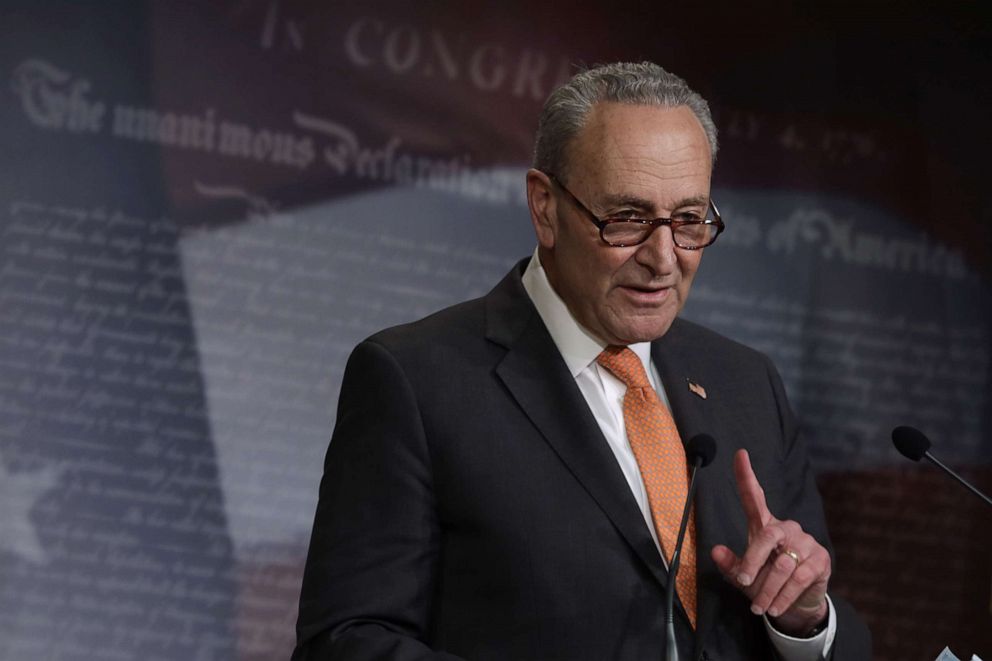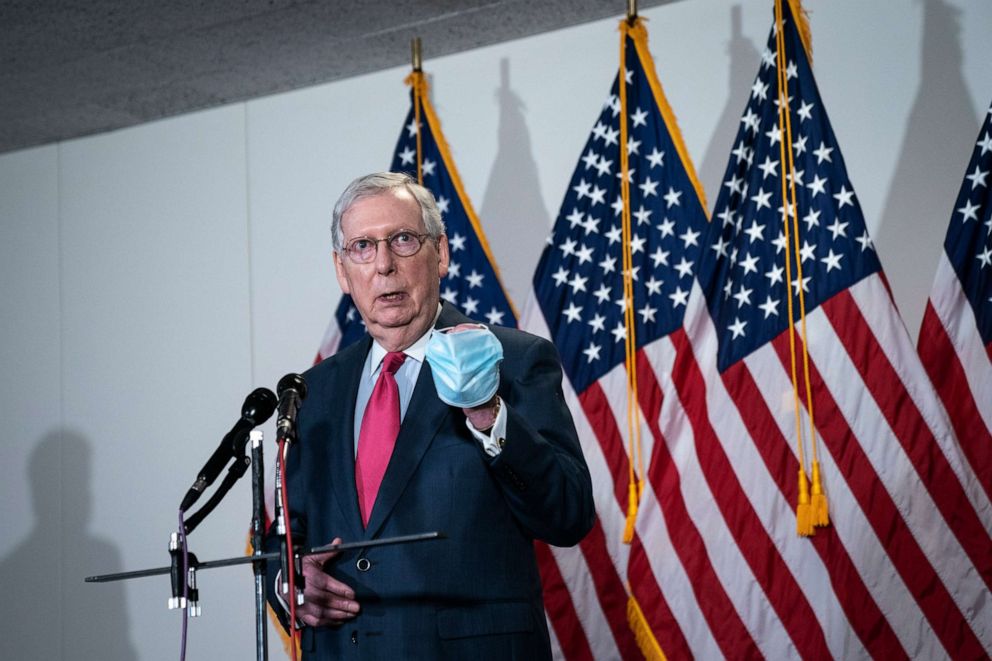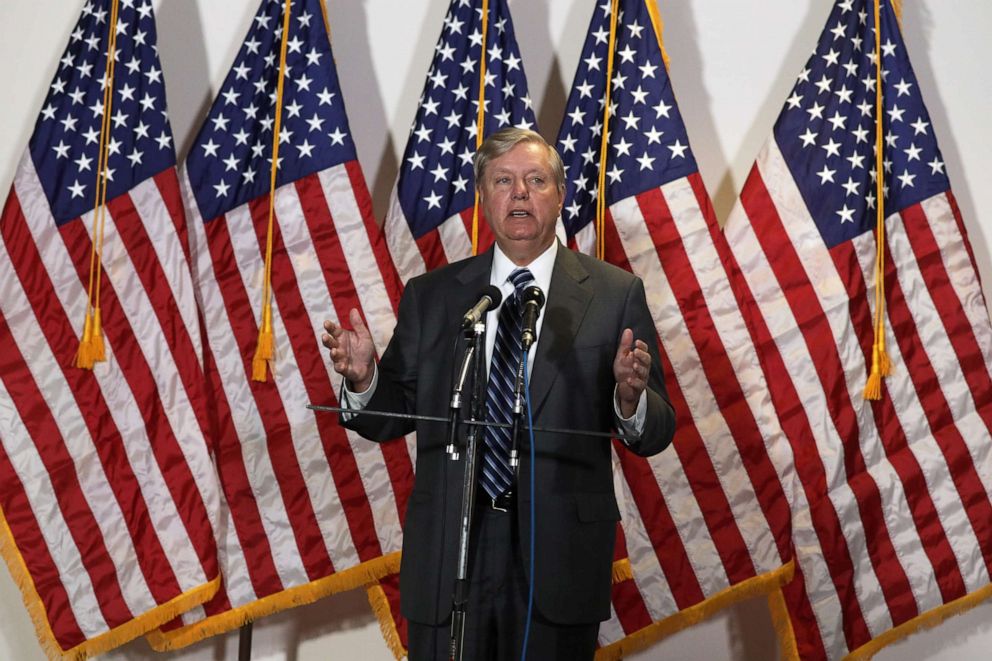Lawmakers react to crackdown on George Floyd protests
Law enforcement reportedly used tear gas to disperse peaceful protestors Monday.
Senate Minority Leader Chuck Schumer painted an ugly image of President Donald Trump "descending the dictatorial ladder" as he lay in bed at the White House Monday night with military helicopters flying above after having his photo taken at St. John's Episcopal Church.
"He probably wore out his remote control watching the clips of General Barr's victory over the unarmed in the battle of Lafayette Square," Schumer, D-N.Y., scoffed. "Then he reveled in the sounds of Black Hawks flying overhead joyously retweeting scores of preening sycophants."
Attorney General William Barr visited Lafayette Park in Washington, D.C. to survey law enforcement prior to the president’s church visit, and also joined Trump and several other White House officials on his journey across the park to the church Monday evening.
With reports that law enforcement used tear gas to disperse peaceful protestors in advance of Trump’s visit to the church, Schumer also called on the Pentagon’s inspector general to lead an investigation into how the military was used at Lafayette Park in tandem with the president’s photo opportunity.
"After the gas, came the horses -- a modern-day cavalry was clearing the battlefield. The purpose, so that President Trump could wave a Bible, not read a Bible, not even his Bible, as a prop," Schumer said. "It was appalling. It was an abuse of presidential power. It may well have been illegal and it was blatantly unconstitutional."

Moments earlier, Senate Majority Leader Mitch McConnell applauded local, state and federal officials for working to "restore peace" amid raging civil unrest across the country, maintaining his disdain for violence associated with the protests in the aftermath of George Floyd’s death at the hands of a Minneapolis police officer.
During remarks on the Senate floor Tuesday morning, McConnell called for a distinction between peaceful protests and "violent riots."
"The former is a cherished constitutional right that ever single citizen should support. The latter is an unacceptable scourge that state and local leaders should have ended days ago," McConnell, R-Ky., said. "So I want to thank federal state and local leaders who are taking seriously the obligation to restore peace, protect the innocent and stop this senseless violence."
The Kentucky Republican, who is up for reelection to a sixth term this fall, called for the nation to unite not just against the killing of Floyd but also against those who are protesting violently.
"Our nation is united in horror and opposition to the violent killing of Mr. Floyd. We are united," McConnell reaffirmed. "It is well past time that we also unite on the side of peace on our streets and peace in our community."
"We need to unite against these violent rioters who only seek to aggrandize themselves and further damage a nation that needs healing," McConnell continued.

Schumer also condemned violent protest methods but argued that while thousands of protesters have been detained, only one of the four police officers involved in Floyd's killing has been arrested.
"It does not excuse the violence in anyway but explains in part why so many Americans are angry," Schumer said. "There is accountability for every day citizens and protesters when they break the law, but there isn't always accountability for those in law enforcement when it does the same."
As the Senate leaders squabbled in the chamber, Judiciary Chairman Lindsey Graham announced he plans to hold a hearing on June 16 to examine the death of Floyd and police misconduct in the United States, promising to "take a deep dive" into the issue in two weeks.
"The topic for the country is what to do after the death of Mr. Floyd, and what does the death of Mr. Floyd mean?" Graham, R-S.C., said at the outset of a hearing he chaired examining the country’s operation of its prisons during the coronavirus pandemic. "Well, it’s a long-overdue wake-up call to the country that there are too any of these cases where African American men die in police custody under fairly brutal circumstances. It’s clear to me that policing and among men in the African American community is a topic that needs to be discussed and acted upon, and I expect this committee to do its part."
Graham, who has often counted himself as one of the president’s top defenders and golfing buddies, said he has consulted with the panel’s ranking Democrat, Sen. Dianne Feinstein, and they’ve penciled in June 16 for a hearing, adding that’s as "quick as we could do it."
"I’d like to get to the root cause of it. Mr. Floyd’s case is outrageous on its face, but I think it speaks to a broader issue," Graham said in stark contrast to the president’s rhetoric on the turmoil. "We just need to get to the bottom of what happened and what we can do to fix it. And the answer is pretty obvious: Community policing is the anecdote to this, where there is a sense of community among the police and those that are being policed. I don’t know how to make that a reality but we’ll have a hearing along those lines."

Senate Minority Whip Dick Durbin lamented that "America still lives in the shadows of its original sin: slavery, and the racism that spawned it."
"Is our system of justice in America so infected by racism that it cannot function in a manner consistent with our democratic values? That’s as basic as it gets in a democratic society," Durbin, D-Illinois, said. "Is our president mobilizing our military to suppress dissent in a manner inconsistent with the constitution and never seen before in history? That is a question that goes to the very heart of our democracy and our role as an equal branch of government."
Durbin urged Graham "not to overlook the fact" that those questions "really go to the heart of our democracy" -- arguing that many other issues the committee plans to examine in the coming days are "irrelevant."
The committee has already scheduled oversight hearings with Rod Rosenstein, the former deputy attorney general, into Crossfire Hurricane, the code name for the counterintelligence investigation undertaken by the FBI in 2016 and 2017 into links between Trump associates and Russian officials, as well as the Digital Millennium Copyright Act’s notice and takedown process for copyright holders to get infringing user-uploaded material removed from websites.
"What is relevant is the question as to how America can be safe and still hold to its democratic values and principles," Durbin contended.
Feinstein said the ongoing civil unrest across the country is "one of those horrible anomalies about life and when it happens it’s so graphic and so real and you can’t control it."
"There’s desperate need to bring people together to show the sameness among us, not to illustrate the badness," Feinstein, D-Calif., said. "You had a police officer responsible for the death of a victim and people reacted, but now what has to happen, the message is clearly sent, what has to happen is we should take a look. We are going to holding hearings."
After days of protests, looting and a hardened police crackdown on the civil unrest, Feinstein said "the message has been transmitted."
"I think they want all of us to work to bring people together, to stop the division and to reform police practices wherever necessary to prevent this kind of thing from ever happening again," she said.
Senate Democrats are also introducing a resolution they will attempt to pass affirming the constitutional rights of Americans, while noting that "violence and looting are unlawful, unacceptable and contrary to the purpose of peaceful protests."
The measure, which is non-binding and unlikely to garner sufficient GOP support, explicitly condemns Trump "for ordering federal officers to use gas and rubber bullets against the Americans who were peaceably protesting in Lafayette Square in Washington, DC on the night of June 1, 2020, thereby violating the constitutional rights of those peaceful protestors."
Given the political divide in Washington, lawmakers expressed doubt that reforms can be achieved to satisfy the needs of the dark moment.
"There’s time, but I don’t know if there’s a will, particularly among Republican leadership," Sen. Richard Blumenthal, D-Conn., bemoaned.
On Antifa, Graham said he’s "sure there’s a part they play, and we’ll try to find out exactly how organized this violence is."
"Most protestors are out on the street to lend their voice for change and the rioting and the looting is not helping the cause at all and it’s got to come to an end," Graham said.



